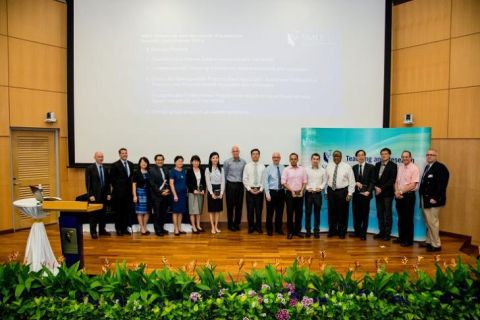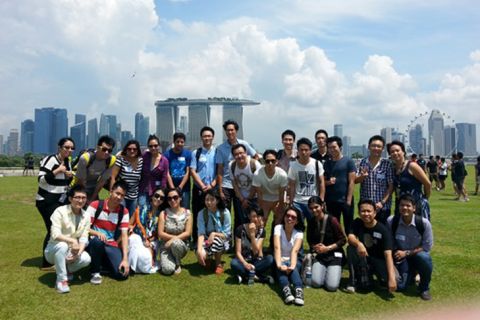
Associate Professor Roy Chua from the SMU Lee Kong Chian School of Business was presented the “Best Article Award” by the Academy of Management Journal (AMJ) for his paper entitled “The Costs of Ambient Cultural Disharmony: Indirect Intercultural Conflicts in Social Environment Undermine Creativity”. He received his award at the 74th Annual Meeting of the Academy of Management on 2 August 2014 in Philadelphia, Pennsylvania.
The mission of the AMJ is to publish empirical research that tests, extends or builds management theory, and contributes to management practice. The AMJ Best Article Award is created to recognise outstanding articles that make strong empirical and theoretical contributions, as well as to highlight the significance of such contributions to the management field. Winning articles are evaluated based on the following criteria:
- Answers the most important research questions concerning general management theory and practice
- Discusses an important idea and original hypotheses
- Presents theory that advances new understanding
- Brings forth appropriate data, sound methods, and significant results that will affect research and practice in the future
A summary of Professor Chua’s paper is provided as follows:
The Costs of Ambient Cultural Disharmony: Indirect Intercultural Conflicts in Social Environment Undermine Creativity
Roy Chua, Associate Professor of Organisational Behaviour & Human Resources
Employee creativity in culturally diverse workplaces has received increasing attention from organisational scholars. Conventional wisdom suggests that cultural diversity is generally conducive for creativity, as the confluence of diverse ideas from different cultures provides a seedbed for creative inspirations. Cultural diversity begets creativity as long as collaborators overcome intercultural conflicts and difficulties.
Conversely, unresolved intercultural conflicts and tension can easily undermine creativity. The negative effects of intercultural conflicts and tensions not only affect people who are directly involved, but also those who are not. No research to date has looked at the effects of indirect intercultural conflicts and tensions on creativity. This research study aims to introduce the concept of ambient cultural disharmony – the experience of indirect intercultural tensions or conflicts in an immediate social environment – and demonstrate how it undermines creative thinking in tasks that draw on knowledge from multiple cultures.
Three studies (a network survey and two experiments) were conducted and the results showed that ambient cultural disharmony decreased individuals’ effectiveness in connecting ideas from disparate cultures. The network survey first demonstrated that the more negative intercultural ties characterise relationships among members of an individual’s social network, the less effective that individual was at combining ideas from different cultures. A priming experiment then extended the finding by testing the mechanism of this relationship. The results suggested that beliefs that ideas from different cultures are incompatible formed the underlying mechanism for the relationship between ambient cultural disharmony and creativity.
A follow-up laboratory experiment showed that negative affect and cognitive disruptions were not viable explanatory variables. Interestingly, although ambient cultural disharmony disrupted creativity, ambient cultural harmony did not promote creativity. Collectively, these studies highlighted that intercultural conflicts were more diffused than one might realise, thus opening up new lines of inquiry in research on intercultural relations and multicultural teams.
The pressures of globalisation have propelled companies to innovate in a global, multicultural context. This research has shown that cultural diversity, though contributory to innovation, must be carefully managed in practice, especially when the desired outcomes are creative thinking and innovation in a global multicultural context. Companies that hire a culturally diverse workforce should actively manage perceptions about events that impinge on intercultural relations within the organisation. Individuals will definitely be well served if they could help their associates from different cultures get along better with one another.
Back to Research@SMU Issue 18 (Sep 2014)
See More News
Want to see more of SMU Research?
Sign up for Research@SMU e-newslettter to know more about our research and research-related events!
If you would like to remove yourself from all our mailing list, please visit https://eservices.smu.edu.sg/internet/DNC/Default.aspx

